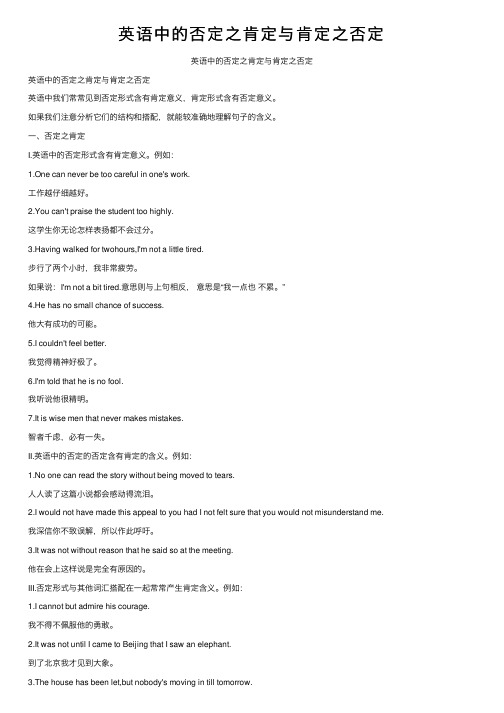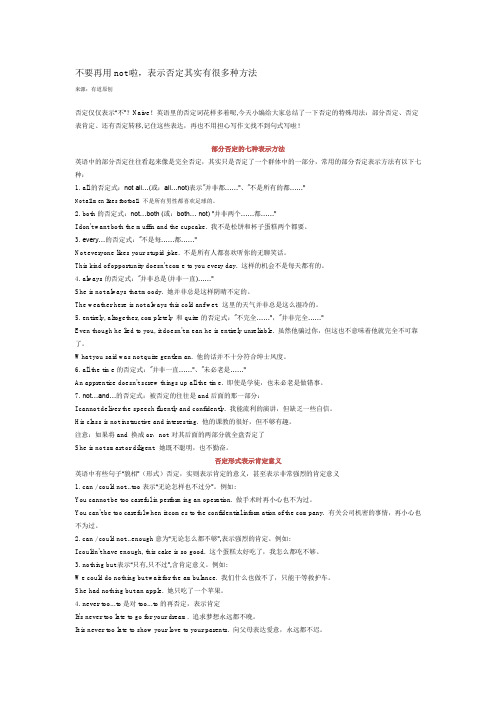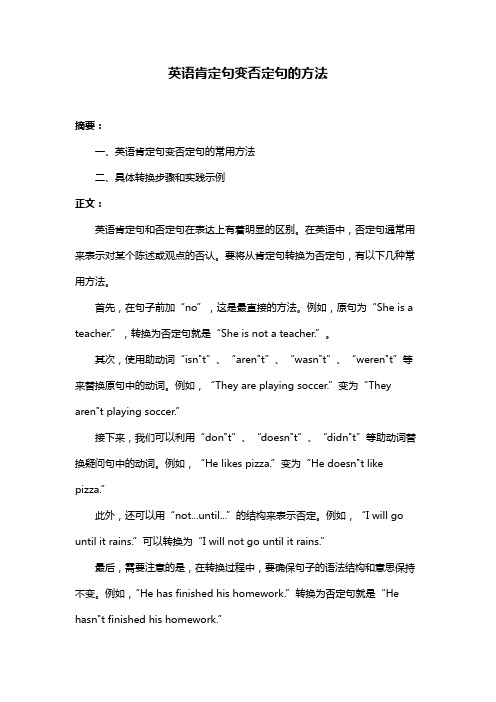英语中肯定形式表否定意义的几种表达
英语中表达含蓄否定的几种常见的方法

【 bt c】 I nlhiivr n ̄o p ̄ n gt e aigb igps  ̄ r eic u, A s at nE g s eyC ll t e r r i ts O nOx eai n yu n i f m b ̄ s s me n s o teo d
i g n g t e f r t x rs e a eme nn Th 。 n e a i om o e p e sn g uv a i g v ec ㈣ n a p o c e r s h lws 1 p r a h sa c a Ao : )Ex r ̄ e a ie p e. n g tv s s
m o d o
I e od】 I pit eai A poc e oiv r yw rs K m lingt e prahs c v P s ief m Nea v aig t o gte i men n 英语 中经常通过 否定谓语或使用舍 否定意 义的前缀 和后
缀 表 达 否 定意 义 , 如 : e om ’ l r n lhw l 或 【 i 倒 H o ce nE gs e . d a i 1 d. s 1e ea i f k 1 但 是 除 了 用这 种 直 接方 法 表 选 否定 外 还 使 用 一 些 含 蓄 的 方 法 表 达 否 定 所 谓 “ 蓄 的 否定 是 指 形 式 含 上肯定 . 而意 义上 的 否定 。也 就 是 说 , 句 子 中 既 不 使 用 m c 在 . n .oh g等 否 定 词 , 不 使 用 1一 , 一. 一ls o onti n 也 n d e .nn一 . s i一等 含 否定 意 卫 的前 缀 或 后 缀 . 是 通 过 其 他 更 含 蓄 的 方 r 而 式 表 达 否 定 。 在 公 共外 语 教学 中常 见的 含 蓄 表 达 否定 的 方 法
[英语学习]肯定与否定的翻译
![[英语学习]肯定与否定的翻译](https://img.taocdn.com/s3/m/24ab35f176eeaeaad1f3307c.png)
无疑,他是一位有进取心的青年人。
What he said is beside the question.
他说的与本题无关。
Good advice is without price.
好的建议是无价的。 It is far from him to do anything to hurt
肯定与否定的翻译
一、英语肯定、汉语否定
形式上,英语采用肯定句式,但实际在含蓄表达否定 意义,翻译成汉语时用否定。 (1)动词 英语中含有否定的动词有:fail, miss, lack, ignore, escape, refuse, withhold, neglect, deny, overlook, exclude, differ, forbid, defy, hate, etc.. 动词词组:keep… from…, refrain…from… Eg. To our disappointment, he failed to take the overall situation into account. 使我们失望的是他不顾大局。
He was deaf to all advice.
他不听一切劝告。 I am glad to see you safe and sound. 我很高兴看到你安然无恙。 He would be the last man to say such
things. 他决不会说这种话。
She went to the airport to meet her friend, but she missed her in the crowd.
她去机场接她的朋友,可是没能在人群中见到她。
Байду номын сангаас
英语中的否定之肯定与肯定之否定

英语中的否定之肯定与肯定之否定英语中的否定之肯定与肯定之否定英语中的否定之肯定与肯定之否定英语中我们常常见到否定形式含有肯定意义,肯定形式含有否定意义。
如果我们注意分析它们的结构和搭配,就能较准确地理解句⼦的含义。
⼀、否定之肯定I.英语中的否定形式含有肯定意义。
例如:1.One can never be too careful in one's work.⼯作越仔细越好。
2.You can't praise the student too highly.这学⽣你⽆论怎样表扬都不会过分。
3.Having walked for twohours,I'm not a little tired.步⾏了两个⼩时,我⾮常疲劳。
如果说:I'm not a bit tired.意思则与上句相反,意思是“我⼀点也不累。
”4.He has no small chance of success.他⼤有成功的可能。
5.I couldn't feel better.我觉得精神好极了。
6.I'm told that he is no fool.我听说他很精明。
7.It is wise men that never makes mistakes.智者千虑,必有⼀失。
II.英语中的否定的否定含有肯定的含义。
例如:1.No one can read the story without being moved to tears.⼈⼈读了这篇⼩说都会感动得流泪。
2.I would not have made this appeal to you had I not felt sure that you would not misunderstand me.我深信你不致误解,所以作此呼吁。
3.It was not without reason that he said so at the meeting.他在会上这样说是完全有原因的。
不要再用not啦,表示否定其实有很多种方法

不要再用not啦,表示否定其实有很多种方法来源:有道原创否定仅仅表示“不”?Naive!英语里的否定词花样多着呢,今天小编给大家总结了一下否定的特殊用法:部分否定、否定表肯定、还有否定转移,记住这些表达,再也不用担心写作文找不到句式写啦!部分否定的七种表示方法英语中的部分否定往往看起来像是完全否定,其实只是否定了一个群体中的一部分,常用的部分否定表示方法有以下七种:1. all 的否定式:not all…(或:all…not)表示"并非都……"、"不是所有的都……"Not all men likes football. 不是所有男性都喜欢足球的。
2. both 的否定式:not…both (或:both… not) "并非两个……都……"I don't want both the muffin and the cupcake. 我不是松饼和杯子蛋糕两个都要。
3. every…的否定式:"不是每……都……"Not everyone likes your stupid joke. 不是所有人都喜欢听你的无聊笑话。
This kind of opportunity doesn't come to you every day. 这样的机会不是每天都有的。
4. always的否定式:"并非总是(并非一直)……"She is not always that moody. 她并非总是这样阴晴不定的。
The weather here is not always this cold anf wet. 这里的天气并非总是这么湿冷的。
5. entirely, altogether, completely 和quite 的否定式:"不完全……","并非完全……"Even though he lied to you, it doesn't mean he is entirely unreliable. 虽然他骗过你,但这也不意味着他就完全不可靠了。
英语肯定句变否定句的基本方法

英语肯定句变否定句的基本方法英语肯定句变否定句的基本方法【导语】英语语法让很多学生都头疼,因为复杂难懂的句式和词组有时难以记忆。
本章主要介绍英语语法中的句子成分,希望对同学们的英语语法学习有所帮助。
1. be动词的否定式be 动词根据不同的人称和时态有不同的形式,在一般现在时中是am , is , are可用作联系动词,构成否定式时,一律在其后面加否定词not.He is reading. --- He is not reading. They are from China. --- They are not from China.2. 情态动词的否定式情态动词的否定式是在其后面直接加not. 如:I can swim. --- I can’t swim. He can dance. --- He can’t dance. You should go to school at seven. --- You shouldn’t go to school at seven.3. 实义动词的否定句实义动词变否定句时,要借助助动词do , does,在一般现在时中用do或者does其句子结构为:主语+ don’t / doesn’t + 动词原形+其它例如:I like pop music. --- I don’t like pop music. He likes running. --- He doesn’t like running.She does her homework at home. --- She doesn’t do her homework at home初中英语句型分类知识点详解:一般否定句与特指否定句1. 一般否定句句型1[主语+特殊定式动词+not+行为动词或表语+其他]1. China of today is not what it was thirty years ago.2. "Isn't that Teddy Thomson out?"-"I think it's him, but I can'tbe a hundred percent sure."3. "Oh, sir, he can't have said such a thing! He can't have spoken like that to you, sir!"4. We must not wait for favors from Nature; we must take them from her.5. I haven't finished the book yet.6. Money could not buy happiness.[注1] He is no fool. Great barkers are no biters.[注2] 二十四个特殊定式动词:句型2[主语+do(does, did)+ not+行为动词+其他]1. Sorrow doesn't buy bread.2. Pure gold does not dread fire.3. "Why is Mr. Cooper so angry today?"-"I don't know why."4. "They did not steal so much."-"I don't care how much." He said, "… A thief is a thief."句型3[主语+ 行为动词+ no/not+宾语+其他]1. A rolling stone gathers no moss.2. Viola, hearing this, knew not how to behave, nor how to answer her.3. I know not what course others may take, but, as for me, give me liberty or give me death!4. We are fleet-winged men at arms; we fear not mountains high or rivers deep.句型4[There be+ no/not/not any+主语(+状语)]1. There was no well in the village at that time.2. Oliver Twist was born in a workhouse… There were no aunts, no sisters, no cousins, no grand mothers.3. There is not a moment to be lost.4. There is no holding back the wheel of history[附注] 一般否定句的其他表达方式:1. Who knows it? (=No one knows it.) Dare he do it? (=Hedare not do it.)2. God only knows! (=No one knows.) As if I would allow it! (= I would certainly not allow it.)3. Catch me doing that!4. If I do I am a villain. (=I will not do.) Do that again if you dare.5. In Heaven, an angel is nobody in particular. They shun personal fame and gains.6. The city and the areas around it are an ice-free port and a nuclear weapon-free zone. The building is in a state of neglect.7. She stood still, trying winly (in vain) to answer the battery of questions raised by the reporters.8. I dislike the idea very much. Mr. White has refrained from making any official comment on the coup in that country. Yesterday she failed to get to school on time. The evidence is conclusive, excluding all possibilities of doubt. They excluded children (from) getting in. We'll forever live up to what the party expects of us. Avoid operating the keys roughly. She was refused admittance by them.9. Slips are scarcely avoidable when you're new to your work. He is ignorant of conditions at the levels. Our PLA is worthy of being called a great army pf the people.10. The meetings were marked by such an absence of lively discussions that at times they were almost on the point of breaking up. Lei Feng's noble deeds are above all praise. To do this is beyond my ability. He is out of the office. (= He is not in the office.) Tom is away from Cambridge. (= Tom is not at Cambridge.) It is far from perfect. That served to strengthen instead of weaken our determination (or: That strengthened, rather than weakened, our determination.) The truth is quiteother than what you think. I know better than to quarrel.2. 特指否定句句型5[…not+非谓语成分…]1. Not a soul was anywhere visible.2. You must always remember not to become conceited.3. The teacher told his pupils not to make such a mistake again.4. I went to see him off, not to meet him.5. We felt sorry for not coming on time句型6[主语+否定式谓语+(宾语)+状语或从句(被否定部分)]1. I don't think it is right to make such hasty decision.2. I'm not feeling very well today.3. I don't believe that he will come tomorrow.4. You can't judge a thing only by its looks.5. He's studying English now, but he doesn't speak English very well yet.6. People did not shake off colonialist's yoke in order to put on hegemonist's yoke.7. Don't think ill of me because I use her help. She gives it cheerfully as you see…返回:初中英语句型分类知识点详解初中英语句型分类知识点详解:部分否定句与全体否定句部分否定句句型7[All, every等总括词…not+谓语动词…]1. All is not gold that glitters.2. All is not lost that is in peril.3. And yet all did not go smoothly between them, for the younger man…had his heart set on New York.4. I don't like both of the novels.5. Every one cannot make music.6. Everybody, it is true, wouldn't like it.7. Such a thing is notfound everywhere.8. The good and the beautiful do not always go together.9. A man of learning is not always a man of wisdom. 10. I don't wholly agree.[注] Some people like that sort of thing; Some don't.全体否定句句型8[no, none等否定词…+肯定式谓语+其他]1. Everybody talks about the weather, but nobody does anything about it.2. No trickery can fool us.3. None of my friends smoke.4. I could remember neither the name of the author nor the title of the book.5. Nothing in the world is difficult for one who sets his mind to it.6. The book was nowhere to be found.7. Neither of the sisters is here.8. Never have we been daunted by difficulties.句型9[主语+否定式谓语+不定代词或不定副词]1. I do not know any of them.2. I did not receive any letters yesterday.3. I don't like either of the novels.4. Justice must not be denied to anyone.5. Did you go any where yesterday?-No, I didn't go anywhere yesterday.6. Anyhow I shall not go today.[注] 不可说 "anybody cannot do it." 只能说 "nobody can do it."句型10[All等概括词+肯定式谓语+含否定意义的单词…]1. All germs are invisible to the naked eye.2. All his plans came to nothing.3. Both visitors are unwelcome.4. Every plan made by him is impossible of execution.5. We all disbelieve in the existence of God.6. Their quarrels are always interminable.返回:初中英语句型分类知识点详解初中英语句型分类知识点详解:延续否定句与半否定句延续否定句句型11[(前句)否定句,+(后句)否定句]1. "Oh, no, no, no and again no," said Pinocchio. "I must bea good boy."2. "Am I troubling you?"-"no, not in the least."3. I shall never do it, not under any circumstances.4. We must not think of him as a big, strong boy. Far from it!5. I don't know how much you've got, and I dare say you hardly know yourself, as it would take a pretty long time to count it.句型12[(前句) 主语+否定式谓语…,( 后句)not+ (同前)主语]1. I'll not do such a thing, not I.2. He will not break his word, not he.3. They will not be discouraged, not they.4. Tom cannot speak Russian, not he.句型13[(前句) 否定句,+ ( 后句)not/neither]1. Frieda didn't go to the dance, neither did Fanny.2. You can't do it, nor can anybody else.3. You did not see him, neither did I.4. Are you not going? Neither am I.5. Oliver did not come that day, nor the next day; nor the next after that, nor for many, many days after.6. I know not what, nor where, neither what latitude, what country, what nation, or what river. I neither saw, nor desired tosee any people; the principal thing I wanted was fresh water.[注1] 有时根据意义上的需要,下列句子是允许的。
英语否定句翻译技巧

英语中的否定形式非常灵活,是一个常见而又较复杂的问题,被认为是英语学习者的一大难点。
有的句子在在形式上是肯定而实质上却是否定,有的则形式上是否定而实质上是肯定,这给学生的理解和翻译造成了很大的困难。
翻译否定句,首先要弄清楚否定结构用法的特点,否则就容易出错。
英语中的否定可分为明否定(包括全部否定、部分否定和双重否定)和暗否定(即含蓄否定)。
这里就以上提到的几种否定结构谈谈翻译上的技巧:一、全部否定(Complete Negation)全部否定是指将句子否定对象加以全盘、彻底地否定。
常用的全部否定词与习惯用语有:not,no,none,never,nobody,nothing,neither…nor,nowhere,no one,etc. 只要使用上述否定词,都是具有全部否定意义的句子。
翻译成中文时,一般把全部否定词照翻即可。
例:He is not a translator.他不是翻译。
This problem is so difficult that none of us can solve it.这个问题太难,我们当中没人能解决。
※需要注意的是,根据句子的意思和中文习惯否定成分有时会发生转换,即否定转移现象。
由think,reckon,consider,feel,believe,hope,suppose,expect,fancy,fear,trust等构成的否定句,形式上否定主句的谓语,而意义上否定从句的谓语。
英译汉时,要把否定转移到从句上。
I don’t think that he can operate the new electronic computer.我认为他不会操作这台新型电子计算机。
I don’t imagine that taxes will be reduced this year.我认为今年不会降低税收。
二、部分否定(Partian Negation)部分否定在英语句子中是对some,all,both,every,many,much,always,often等词的否定,不论否定词“ not”放在这些词的前面,还是同句中谓语一起构成否定式谓语,都属于部分否定。
英语肯定句变否定句的方法

英语肯定句变否定句的方法摘要:一、英语肯定句变否定句的常用方法二、具体转换步骤和实践示例正文:英语肯定句和否定句在表达上有着明显的区别。
在英语中,否定句通常用来表示对某个陈述或观点的否认。
要将从肯定句转换为否定句,有以下几种常用方法。
首先,在句子前加“no”,这是最直接的方法。
例如,原句为“She is a teacher.”,转换为否定句就是“She is not a teacher.”。
其次,使用助动词“isn"t”、“aren"t”、“wasn"t”、“weren"t”等来替换原句中的动词。
例如,“They are playing soccer.”变为“They aren"t playing soccer.”接下来,我们可以利用“don"t”、“doesn"t”、“didn"t”等助动词替换疑问句中的动词。
例如,“He likes pizza.”变为“He doesn"t like pizza.”此外,还可以用“not...until...”的结构来表示否定。
例如,“I will go until it rains.”可以转换为“I will not go until it rains.”最后,需要注意的是,在转换过程中,要确保句子的语法结构和意思保持不变。
例如,“He has finished his homework.”转换为否定句就是“He hasn"t finished his homework.”总之,掌握以上方法,就可以轻松地将英语肯定句转换为否定句。
在实际应用中,根据不同的语境和句子结构,选择合适的方法进行转换,使句子更加丰富和生动。
小议英语中特殊的否定现象

一、形式肯定,意义否定1.“too...to...”结构,表示“太……以致不能……”。
例如:We are to o tired to w alk any farther.我们太累不能再往前走。
She is to o yo ung to g o to schoo l.他太小还不能上学。
注意:如果too后形容词表示主语的状态、心理活动、情感态度,如g lad,easy,ready, anxio us,eager,w illing,happy,etc.,并与其后的不定式构成固定搭配,这时to o含有肯定意义,表示“very,extremely”的意思。
例如: They are to o anxious to know the result of the exam.他们极想知道考试结果。
M r.Brow n w as too eager to see y ou.布朗先生极想见到你。
I’m too happy to meet you.见到你非常地高兴。
2.“……否定词+but+肯定形式的谓语”,意为“没有……不……”。
but是否定意义的关系代词,相当于who/tha t...not...或without doing。
例如:In their class there is no one but ho pes to go to univ ersity.=In their class there is no one who do es no t hope to go to university.在他们班没有不希望上大学的人。
There is nobody but makes mistakes.=There is nobody w ho doesn’t make mistakes.人人都会犯错误。
There is no parents but love their o wn children.=There is no parents who don’t lov e their ow n children.没有不喜欢自己小孩的父母亲。
- 1、下载文档前请自行甄别文档内容的完整性,平台不提供额外的编辑、内容补充、找答案等附加服务。
- 2、"仅部分预览"的文档,不可在线预览部分如存在完整性等问题,可反馈申请退款(可完整预览的文档不适用该条件!)。
- 3、如文档侵犯您的权益,请联系客服反馈,我们会尽快为您处理(人工客服工作时间:9:00-18:30)。
英语中肯定形式表否定意义的几种表达-英语论文英语中肯定形式表否定意义的几种表达浙江杭州外国语学校王丹英语中表否定的方式有很多,除了使用绝对否定词表达否定以外,还可以通过单词、词组、句型和特定的句子等形式来表示相对的含蓄否定,这样既可以避免否定词的重复使用,也能使否定语气缓和而富有感情。
笔者把一些常见的肯定形式表否定意义的表达法总结归纳如下。
一、表示含蓄否定的单词1. 名词, 如absence,failure,lack,refusal等。
His absence of mind during the driving nearly caused an accident. 他开车时心不在焉,差点酿成交通事故。
He was upset by his failure in the exam. 他因考试不及格而感到沮丧。
2. 动词,如avoid,escape,miss,stop等。
She braked suddenly and avoided an accident. 她紧急刹车,从而避免了一场车祸。
The pin escaped my eyes. 我没有看见那根针。
3. 形容词,如different,ill,poor,wrong等。
Lily and Lucy are quite different even though they are twins. 莉莉和露西尽管是双胞胎,但却很是不一样。
He is in ill health. 他身体不好。
4. 介词,如above,beyond,instead of,out of等。
The novel is above me. 这本小说我看不懂。
The progress of the reform and open in every respect in China is indeed beyond belief. 中国在改革开放方面取得的进展的确令人难以置信。
5. 连词,如before,or,unless等。
He was hit on the head and fainted before he could figure out what had happened. 他还不知道发生了什么,就被人打在头上,昏了。
Lay down your arms,or die. 缴枪不杀。
He’ll accept the job unless the salary is too low. 如果薪水不太低,他就会接受这一工作。
6. 副词,如scarcely,otherwise等。
I scarcely think so.我可不这么想。
You obviously think otherwise. 显然你的想法不同。
二、表示含蓄否定的短语1. 动词短语,如keep/prevent...from…,differ from,keep off,leave alone 等。
The parents keep their kids from going out. 父母不让他们的孩子出去。
My answer to this question differs from his. 我这道题的答案和他的不同。
2. 形容词短语,如blind to,far from,free from,short of等。
He is completely blind to her faults. 他一点儿也觉察不到她的错误。
What we have learnt is far from enough. 我们所学到的东西远远不够。
3. 介词短语,如at a loss,in the air,in vain,out of the question等。
I’m at a loss for words. 我不知道怎样措词。
The date of the spring outing is still in the air. 春游的时间还未确定。
4. 其它短语,如anything but,the last thing/person,let alone,for fear that 等He is anything but stupid. 他根本不笨。
That is the last thing I want to do. 这是我最不愿意做的事。
三、表示含蓄否定的句型1. too...to...句型,表示“太…..而不能”。
Instances are too numerous to list. 例子多得不胜枚举。
The news is too good to be true. 消息太好,恐不靠谱。
注:①too后面的形容词是anxious,ready,inclined,apt 等时,则无否定意思。
Men are too apt to forget. 人们往往健忘。
②too前面有all,but,only等加强语气的词或否定词如never时,则为肯定意义。
One is never too old to learn. 活到老,学到老。
I am only too glad to do this. 我很乐意去做此事。
2. rather than...,rather...than...,prefer to…,prefer...to...等表“选择”、“取舍”意思的句子,否定的意义包含在than/to之后。
She’d rather die than give up her faith. 她宁愿死也不愿放弃信仰。
I prefer watching basketball to playing it. 我喜欢看篮球,不喜欢打篮球。
3. more…than…(more than)连接两个相同句子成分,但进行不同质的比较时,表示“与其说……不如说”。
He is more brave than wise. 他有勇无谋。
It was more how he said it than what he said that made her angry. 与其说是他说的话,不如说是他说话的方式让她很生气。
注:①此种表达法也可不用more,而在句子前半部分用形容词或副词的比较级,如She is kinder than she is wise. 她善良有余,智慧不足。
②比较级+than+动词不定时,表示“不至于……”I’m wiser than to believe that. 我不至于愚蠢到相信这件事。
③more…than...(more than)加上情态动词can,表示否定意思。
The beauty of Hangzhou is more than words can describe.杭州景色之美是语言所不能描述的。
4. It’s…since… (since后用延续性动词),表示“没做……已经多长时间了”。
That was really a splendid evening. It’s years since I enjoyed myself so much. 那天晚上简直是棒极了,我已多年没有玩得如此开心了。
注:若since后面接瞬间性动词,则意思为肯定。
四、表示含蓄否定的句式1. 英语的疑问句在特定的语境中可以表达更强烈的否定意义。
Shall I ever forget her? 我决不会忘掉她。
——What on earth is he busy doing?他究竟在忙什么?——Who knows?(=Nobody knows.)谁知道呢?(没人知道。
)Who cares where you slept?(=Nobody cares where you slept.)谁管你睡哪儿?(谁也不管你睡哪儿。
)Can anyone doubt the wisdom of this action? 谁能怀疑这一行动的明智呢?(谁也不能怀疑这一行动的明智。
)2. 虚拟语气可表示委婉的否定。
①表示与现在事实相反或愿望时。
If I were you,I should wait till next week. 如果我是你,我就等到下个星期了。
If only he were alive. 他要是活着就好了。
②虚拟条件句should(might,ought to )have +过去分词,表示责备或委婉的否定。
The train should have arrived at 8:30. 火车本应该8:30到的。
If we had taken the other road,we might have arrived here in time for the meeting. 如果我们走另外一条路,我们本可以准时到会的。
③had meant/intended/planned...等表示过去未能实现的愿望、意图等。
We had meant to be early. 我们本想是早点来的。
I had planned to visit you yesterday,but I had an unexpected visitor. 我本打算昨天去找你的,但我家来了个不速之客。
五、英语中一些谚语表达否定意思Call a spade a spade. 直言不讳。
Riches have wings. 财富不常在。
Friends must apart. 天下没有不散的宴席。
Far from eyes,far from heart. 眼不见为净。
Spare the rod,spoil the child. 不打不成器。
Pay on the spot,borrow a lot. 有借有还,再借不难。
Haste makes waste. 欲速则不达。
Beauty is only skin deep. 人不可貌相。
从以上的例子可以看出,英语含蓄否定形式多样,表达灵活,形象生动。
通过了解它们有助于对英语语言本身以及其背后文化的更深刻地理解。
(责任编辑:郭跃进)。
